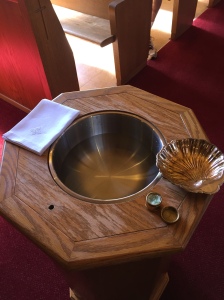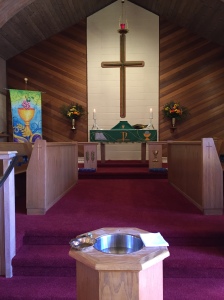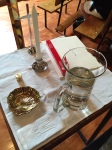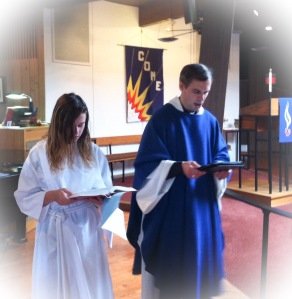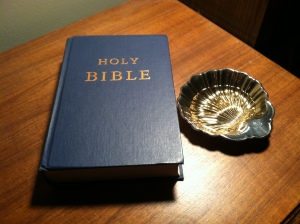3rd Sunday of Easter, year A, preached 4/30/17
first reading: Acts 2:14a, 36-41
Psalm 116:1-4, 12-19
second reading: 1 Peter 1:17-23
There are times in our lives when we’ve all faced disappointment. Deep disappointment. Sometimes that disappointment is also accompanied by a loss of hope. I think I can safely assume that most of us also have gone through periods of hopelessness. I know I have.
Disappointment and hopelessness can lead to profound grief over what “could have been.” But grief can also lead to disappointment and hopelessness. Grief can be the cause or the result.
For our disciples this morning, grief was the cause. This was just a few days after the crucifixion. They had lost Jesus. They had been in Jerusalem, where just the week before Jesus had entered triumphantly to “Hosanna’s.” A week before, filled with hope.
Now they were leaving, filled with grief. And this grief wasn’t only for the loss of a teacher. This was grief for what they had hoped Jesus would bring to their people. As they would tell the “stranger” walking with them, “we had hoped that he was the one to redeem Israel.”
They “had” hoped. Hope in the past tense. Hope gone. They were grieving the loss of Jesus, but they were also grieving the loss of hope.
I can only imagine their disappointment. Their teacher dead, hopes crushed. The believers hiding and dispersed. I’m sure they felt like God had abandoned them. They obviously thought there was no reason for them to stay in the holy city. And so they were walking away in grief.
Pastor Robert Hoch of Baltimore writes, “There are some walks that are longer than others – not because of the miles or even because of the landscape, but because of the burdens…”¹ And into this journey, which Pastor Hoch refers to as a “walk of hopes in shambles” comes a stranger.
They were “talking and discussing” and this man they didn’t recognize asks them a question: “What are you discussing with each other while you walk along?”
One of the disciples, named Cleopas, basically says, “What rock have you been hiding under? How could you NOT know?” To which Jesus basically answers, “Then tell me.”
And Cleopas does. Cleopas pours his heart out to Jesus the stranger. Most telling is his account of the empty tomb. He and his companion know about the women finding it empty, they know about the “vision of angels who said that he was alive,” but it seems they couldn’t bring themselves to believe it.
Then it’s Jesus’ turn to talk. First we need to understand that when he calls them “foolish” – what he really means is “thoughtless.” He isn’t calling them stupid or rejecting them. He’s pointing out that their hearts have been “slow” – they’re not connecting the dots. So he does it for them.
The Word proclaims the word. Jesus “interpreted to them the things about himself…” Then after the Word proclaimed the word, Cleopas and his companion implored the stranger Jesus to stay with them. They were living the gospel of Christ – loving their neighbor by showing hospitality.
Then in the breaking of the bread they saw the stranger for who he was.
Grief turned to joy! Hopelessness to purpose! Disappointment to mission! Back to Jerusalem they go to share their experience!
All along, even when they were disappointed and hopeless and filled with grief, and even in their confusion, the Savior was with them. They just didn’t realize it.
Their words are telling. And they tell us where WE can find the Lord when WE feel lost, disappointed, hopeless, confused or grieving.
Their hearts were “burning” while Jesus preached, and then recognized him in the “breaking of the bread.” How Lutheran of them! This is “CHURCH” for us – where the Word is preached and the sacraments are administered.²
Often when we hit rough patches in our lives, when nothing seems to be going right, when we feel hurt or betrayed or abandoned, when it seems to be one thing after another, we might doubt God’s presence or even existence. Or we might not doubt God’s presence but doubt God’s LOVE for us while we’re deep in our troubles.
This is precisely when we need to be reminded that we are NOT alone, that God not only exists but is indeed “with us” – Emmanuel – in the midst of all our mess. And “church” is the best way we have to get that reminder.
Church – where we hear the Word proclaimed, the uncompromising unconditional love of Jesus who gave his life for us, not because our lives are great, but precisely because they are NOT.
Church – where we receive the sacraments of love – the covenants – that God has made with us. Baptism, when we are marked with the cross of Christ forever; and Holy Communion, when we receive the new covenant in Christ’s blood.
God gives us the gift of Jesus and Jesus gives us the gift of the Word and Sacraments, so that our hearts might burn too, and realize his presence with us.
The Emmaus road is a hard road to walk for any of us – but even there, especially there, Jesus shows us that he is with us, just as he was with Cleopas and the unnamed companion.
It’s true that sometimes Jesus feels like a stranger to us. We feel alone – hopeless and grieving. But even when we don’t see him he is there. Even when we don’t recognize him he is holding us.
And while the Church isn’t always perfect, indeed is NEVER perfect, the Church is still the place “where two or three are gathered”³ that Jesus promises to be.
Where we are reminded explicitly that God loves us and is with us no matter what.
Where we are reminded that our hope is ETERNAL life, but also that God holds us and walks with us in THIS life too.
This is our Easter hope. Alleluia.
AMEN.
¹source: Working Preacher commentary for Easter 3, year A, 2017, at WorkingPreacher.org
²Augsburg Confession, article 5
³Matthew 18:20

